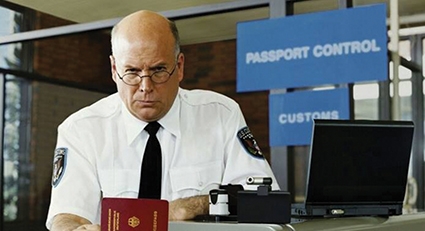Avoiding the Marching Orders: Ogden on Visas
OPED
I took Georgian citizenship three years ago during the Saakashvili era, mostly due to the misguided notion that I should buy a rifle and pistol in case the Russians came back. Not that I had any intent to recreate Custer’s Last Stand on Mtatsminda Mountain, nor am I like those Americans one reads about who stockpile guns, dry food and water in cellars (which they usually refer to as their ‘bunker’, or worse yet, ‘command center’); the kind of people to whom a combined Russian, Chinese and North Korean invasion of the United States would fulfil a martial fantasy. I’m not like that at all; I just felt that I’d rather be armed than not, undoubtedly a result of my own military service. Not, of course, that I could do much alone; I left the Army as tough as a buttered muffin, and during my service frequently relied on the skill of better men to keep me safe (from outraged platoon sergeants rather than the enemy), and these days I’m sure I couldn’t even defend my home against a determined group of Girl Scouts, but back then I still wanted to own a rifle.
It is, then, perhaps rather ironic that I did indeed become a Georgian citizen (in those days they were giving them out like Mars bars, providing you were from the right sort of place, by which I mean any country west of Poland), but never actually bothered to buy any guns. The risk of renewed warfare died down considerably after the Russians decided that shooting Georgians was, really, a fashion of 2008, and slaughtering Ukrainians became ‘the thing’, so I was spared from having to do my best Rambo impression (and probably getting shot by the police for endangering the public). Besides which, I’m fairly confident that in the event of a Russian invasion, I would find myself travelling at high speed to the British Embassy to bash my passport against the window and bawl for consular assistance.
Yet despite my selfish and eccentric reasons for wanting to become a Georgian citizen (which I took care not to put on my application, you may be sure; it almost feels a shame to tell the truth now), it ended up being rather a good idea. There are certain hazards, of course – for one thing, I am now eligible to be called up to the Georgian Army (though if the Ministry of Defense think they can get me in a uniform, they can think again. My soldiering days ended in 2010, and it can damn well stay that way. Besides which, between ourselves, I think that my Georgian language skills, which don’t go much beyond going to shops or barking at taxi drivers, would be rather detrimental to the Georgian war effort), and as far as I know, I could also be ordered to do jury duty. God help The System, I say.
The biggest bonus has been the fact that I no longer need any sort of visa stamp or permanent residency card. This never seemed to be of much importance until last year; I usually travel back to Europe a few times a year, and whenever I came back to Tbilisi my passport would be stamped once again, granting me another 365 days in Georgia with no negative consequences apart from the raised eyebrow of the border control officer. Indeed, I’ve always had more trouble from the British border police – when travelling back to Tbilisi one day and confronted by a police officer with the enquiry ‘Whut you doin’ aht there, then?’, I was rather at a loss for words. It was only after fifteen minutes of explaining my turbulent love life - which was anchored in Tbilisi - that the officer sighed and told me ‘Gawan, then. Bugger off’.
The problems began last year, when the new government changed the visa laws, apparently due to some mad notion that if they made their border regulations tighter they would be closer to achieving ‘European standards’. What exactly European standards are still seems to be something of a mystery, and getting them could well be described as being as easy as finding the Holy Grail (incidentally, I imagine that Georgians, being impetuous and passionate, would probably break the Holy Grail in their hurry to get at it; there’s a nice analogy there, somewhere). It was doubly ironic that European and American citizens, who do not need visas to visit each other’s countries, were then required by law to return to their homelands at the end of their visa term and reapply at the Georgian embassy in their country. If these mythical ‘European standards’ are supposed to be the same ones that are applied in the European Union, then neither Americans nor EU citizens should need visas (European visa standards, presumably, include European citizens).
I wasn’t aware of the tighter visa laws until I went home in December, and the border police officer then informed me that I had outstayed my visa term. Since he told all of this to me in Georgian (I wasn’t sure what it was about my appearance or my British passport which suggested I was fluent in Georgian), I did what English people usually do when confronted with an angry-looking foreigner speaking his foreign language, which was to nod and smile placidly. This caused me to be led to another kiosk, wherein a penalty fee was demanded from me for outstaying my welcome; comprehension then took hold, and I proudly produced my Georgian citizenship ID card, hoping that we’d all be friends now and have a chorus of For Eg Aris Erti Jolly Good Fellow. Not so – I gathered that I should have mentioned my citizenship earlier, but I did at least save the police officer from having to fill in the penalty forms, which caused him to wish me a good flight in a tone of voice which suggested he hoped my aircraft would be hit by a wayward Russian missile.
After a few months of listening to my foreign friends complaining about the visa regulations and smugly contemplating my Georgian citizenship (and looking over my shoulder to see if any Georgian sergeant-major was preparing to drag me off to the Army), the visa laws were reversed – and apparently then reversed again, and once more – so that in theory Europeans once again have the right to stay for a year without any additional visa.
I was baffled, then, on returning home again in July to have to reproduce my Georgian ID since I had once again apparently outstayed my visa term. The Internet sources are contradictory, and even Georgian border officers seem to be at something of a loss. The true victims are people like my friend from South Africa, who, having already had his permanent residency rejected (due to him being designated ‘dangerous’; difficult to believe, seeing as a strong wind looks as though it would knock him over and he teaches English for a living, which is not famously a profession which grants people access to high explosives) was then forced to pay a visa penalty when travelling to Turkey. According to the new law, he was still within his original leave to remain.
This, of course, could be put down to the confusion or incompetence of the officers in question, but another case of my Iranian friend having her refugee status rescinded for no good reason is rather more alarming. Though there is still hope since her court hearing is scheduled in six months’ time (she’s another one who’s been labelled as being ‘dangerous’, you’ll be charmed to know), one might have thought since she had already been granted leave to remain, the government might stick by its word.
Besides annoying police officers with my lack of understanding as to when exactly I should show my Georgian ID at the airport, I personally have little to fear (except perhaps being blown up in another Russo-Georgian war, but that’s another story), but it is frustrating, infuriating, and above all rather tragic to see good people who really do want to live in Georgia are denied the chance to do so.
Tim Ogden












